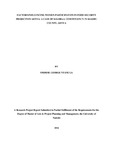| dc.description.abstract | This study sought to investigate the factors influencing women participation in food security in Kiambaa Constituency of Kiambu County. This study was to elucidate the factors of women literacy, access to agriculture information, land ownership and Gender Action Plan policy response influence women participation in food security projects in Kiambaa Constituency. The findings of the study may be valuable in planning for food security by the Kenyan Government. A survey research design was used on a sample of 381 women household members of the Kiambaa arrived at using Krejcie and Morgan‟s sample size estimation table and was selected through simple random sampling from a target population of 41,931 households in the five divisions of Kiambaa. Data collection was done by the use of questionnaires and interview schedules. In addition, 10 key informants were selected using a systematic random sampling method for triangulation. The data was analysed by the aid of Statistical Package of Social Scientists Program (SPSS). The study found that most women participating in food security projects in Kiambaa Constituency, Kiambu County apply ideas that they learn about farming activities. Smallholder subsistence farmers, especially women, are responsible for food security projects. The study found that women‟s ability to access agricultural information is key to food security. Agricultural information not only endows one with the power to read and hence be informed, but it also allows one to farm in an effective way. The study further found that women land ownership influence food security since women use land fully for subsistence farming. Subsistence farming mainly provides families‟ staple food and in the case of extra supply it could be sold to cover for household expenses. The study finally found that Gender Action Plan policy responds to food security in their area but has not been fully implemented. Ineffective Gender Action Plan policy trends hinder improvements in land productivity and land certification project hence affecting food security in Kiambaa Constituency. The study concluded that smallholder subsistence farmers, especially women are responsible for food security projects and contribute substantially to the national agricultural production. Therefore, literacy, access to agricultural information, land ownership and Gender Action Plan Policy response for women farmers are vital for household food security. The study recommended that more women should be encouraged to join women groups which eventually would enable them initiate income generating projects to boost food production for sustainable food security in the area. | en_US |



